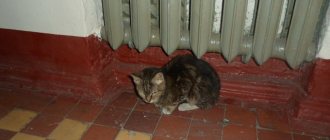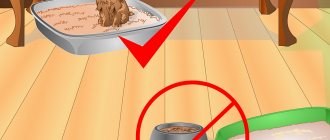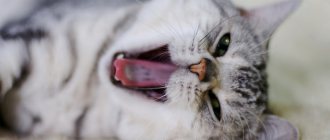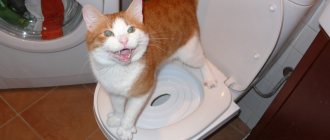Cat owners often face the problem of damaged wires and cables in their house or apartment. Moreover, from the outside it may seem that the animal is engaged in sabotage purposefully. But usually this behavior is due to a number of reasons that are worth considering in order to understand how to stop a cat from chewing wires.
How to stop a cat from chewing wires
Wire insulation methods
Get ready for the fact that cats are very stubborn and are able to reach the cable in the most impossible ways.
The simplest and most effective means of protecting cables is their insulation. It helps protect the integrity of the cable and reduces risks to the animal's health.
Table 1. Wire insulation methods
| Method | Implementations and notes |
Cleaning | All unused wires must be removed out of reach of the animal. Chargers can be hidden in a closet, in a table or on a high shelf. And those cables that are used less than a few times a week can be put away in a special box |
Tubes | The most convenient way is to hide constantly used wires in special tubes. Cats also show interest in cables because they are small in size and therefore easy to chew on. Tubes for wires are sold at building supply stores. They are large enough that cats cannot damage them, making them great for protection. |
Ties | Ordinary construction ties can also help insulate cables. When the diameter of the wire increases, the purr becomes uninterested in playing with it, and it becomes more difficult to chew on it. Therefore, this method also helps to protect the cables and put them in a certain order. |
Fastening to furniture | Those wires that cannot be removed and hidden are recommended to be secured to the furniture as much as possible so that they do not dangle. To do this, you can use a construction stapler or special fasteners. |
Skirting boards | An excellent way to insulate is baseboards. Modern models have special sections for wires. If there are no such compartments, you can disconnect the baseboard and lay the cable under it. This method will not only protect the pet, but also preserve the aesthetics of the room. |
Treatment with special substances | There are a number of substances whose smell repels cats. But here it is important to maintain a golden mean - not to choose scents that will make the owners feel unwell and at the same time periodically refresh the treatment |
Double sided tape | Cats really do not like sticky substances and surfaces, and therefore one of the insulation methods can be called double-sided tape. Your pet is guaranteed not to play with the sticky cable. But this method has its drawback - dust and pet hair will constantly collect on the sticky surface, and therefore the wire will quickly look untidy |
Foil | Despite the fact that foil can rustle interestingly and shines quite brightly, cats do not like to play with it. The reason for this is the alkaline taste that appears when you chew it. Therefore, this method can also be used as protection for cables. But there is a possibility that the animal's interest will be renewed after the foil is removed |
Video - An alternative method of protecting wires from a cat
Why do they like to chew on wires?
The main reason lies in the kitten’s usual curiosity and playful habits. An animal bored without the attention of its owner is looking for ways to have fun. He explores with interest various objects in the house that could become an exciting toy for a fun pastime. Very often this choice falls on television cables and electrical wires that are freely available.
The kitten is teething
This is another reason for the interest in wires. It is very pleasant to scratch your itchy gums on the hard surface of the electrical wiring. The owner of the animal needs to be vigilant and promptly stop the kitten’s next attempt to scratch its teeth. As an alternative, it is better to purchase special toys for scratching gums for your tailed family member.
Lack of toys
A small kitten, like a child, loves to spend time in outdoor games using various means. To prevent your pet from showing interest in wires, purchase animal toys for him in advance.
Soft food
If your cat eats only soft food, it is not surprising that she shows great interest in electrical wires. The smooth and hard surface is ideal for maintaining oral hygiene.
Solid food allows such care. If it is not in the animal’s diet, it will look for suitable items to replace it. In this case, it is necessary to diversify the kitten’s diet by adding to the menu some solid food products that are acceptable for feeding according to age.
Lack of attention
Many owners do not understand why cats chew electrical wires, but do not even think that only they are to blame for this behavior. This is due to lack of attention to the pet.
If a kitten is alone with itself for a long time, and when the owner returns home it remains unnoticed, he will diligently look for ways to attract attention to his person.
Poor diet
The kitten chews on various wires due to a lack of certain vitamins and mineral complexes in the body. Review your pet's menu and exclude cheap food that does not contain the necessary substances for the kitten's full growth and development. Proper nutrition is not only the key to health and long life, but also to the good behavior of your furry friend!
How to wean kittens from playing with wires
The appearance of a kitten in the house is a pleasant and exciting event. The little creature actively begins to explore the world, constantly runs around, plays with everything it sees. To protect him from possible threats and keep his home intact, you can immediately prevent his interest in cables:
- insulate hanging wires;
- hide various chargers and headphones from view;
- remove cables lying on the floor;
- purchase special toys for the kitten;
Interested in the game, pets will pay less attention to unsafe wires
- devote enough time to your pet;
- choose a balanced food so that the kitten does not experience a deficiency of minerals and trace elements;
- monitor the condition of the animal’s oral cavity, give the kitten food that needs to be actively chewed;
- Place colorful cocktail straws near the cables - they will perfectly distract your pet's attention.
Kittens play with wires much more often than adults
The most important recommendation is to be patient. When a kitten appears in a family, the owners do not immediately recognize all its habits. You shouldn’t create a negative reaction in your pet by shouting and punishing, because he doesn’t even understand what exactly he’s doing wrong. To curb your kitten's interest in cables, you can give him special food that will stimulate his gums and make teething easier.
The main reasons for showing interest in wires
How to stop a dog from chewing everything in the absence of the owner
If a cat has chewed through an electrical wire, then there is some reason for this behavior. The main ones are described below.
Curiosity
At birth, kittens learn about the world and are attracted to everything that lies, hangs, or moves incorrectly. Cats are playful animals by nature, so there must be special toys in the house that will help avoid cutting wires in the absence of their owners.
Attention deficit
Kittens, like small children, constantly need attention, and in its absence they look for a replacement: they tear up wallpaper, scratch furniture, tear curtains, and also begin to bite wires. Thus, the animal simply attracts attention to itself, in dire need of communication.
Lack of communication
Scratching teeth
Kittens may begin to chew on wires when they are changing their baby teeth to permanent ones. The gums itch and you want to scratch them. Why not bite the wires if the owner did not worry about this in advance and did not purchase special toys that could be used to scratch the gums.
Adult cats begin to chew the cables, thus cleaning their teeth from the plaque that has formed. This happens because the animal consumes liquid food all the time. Plaque accumulates on the teeth, which must be removed by gnawing on something hard.
Attention! To avoid cable biting as an adult, it is necessary to alternate liquid meals with dry food to remove plaque.
Lack of useful microelements and vitamins
If an animal lives on the street, then it itself compensates for the lack of vitamins in the body by eating grass and other necessary plants. But things are more complicated with pets. They receive all the necessary vitamins and microelements exclusively from special food, but their lack can provoke gnawing on wires and eating flowerpots, because the animal tries to make up for their deficiency.
Few toys
Most owners, when kittens appear in the house, do not spend money on purchasing special toys, because you can easily and quickly make them yourself, for example, tie a small piece of paper to a rope, or take a ribbon and tie it to something so that the animal can play. As a result, over time, the animal begins to grab wires, which will look like ropes, ribbons, temptingly hanging from tables, windows and other places. To avoid this in the future, you should buy toys specifically designed for cats.
The cat chewed the wires - what to do?
If the cat does chew the wires, there is no need to shout or swear at it. Any punishment will lead to the fact that the pet will be offended and begin to harm out of spite. If a furry bully is caught chewing on cables, you can clap your hands or make some loud noises to scare the animal away.
The sooner you stop your cat from accessing the wires, the better it will be for everyone.
Then you need to check the integrity of all wires. It must be remembered that a damaged cable can cause a fire, and therefore it is better to repair it immediately. After checking, you need to remove all wires that your cat might chew from within reach to avoid further damage.
To prevent a similar situation from happening again, it is necessary to analyze the pet’s behavior. To do this, you can answer a number of questions:
- How long ago did this start?
- Did the purr's diet change during the period when he began to show interest in cords?
- Is there enough time for your pet? Do his owners often play with him?
- Does your cat have toys to which she can turn her attention?
Weaning off wires can take quite a long time and the older the animal, the longer it will take for him to wean off the habit. Therefore, owners of inquisitive cats need to be patient and try to identify the root cause of their pet’s behavior.
Re-educating a cat will take months, so you should be patient.
If the cat shows interest not only in the wires, but also itches on toothbrushes and combs, then it needs to be shown to the veterinarian. Most likely, she simply has problems with her teeth, which is why she tries to scratch her gums. The veterinarian will be able to examine the purr, clean the teeth, and also determine whether the animal is eating a sufficiently balanced diet.
If the cat chews everything that is allowed and what is not allowed, then you need to think about going to the cat dentist
Note! When selecting food, you should try to give preference to those formulations that contain iron and taurine - a deficiency of these substances often causes increased interest in cables.
Why does a cat chew wires and what to do about it?
Perhaps almost everyone will agree that a cat’s habit of chewing wires is the most harmful of all possible.
Firstly, if the wires are live, then the pet itself risks its health and even life. Secondly, due to a chewed wire, a short circuit can occur, in some cases this can even lead to a fire. And thirdly, because of this, quite expensive things can fail. That is why it is so important to understand in time how to stop a cat from chewing wires. The Murkosha shelter has encountered this problem more than once, so they have developed several rules that help wean a cat from a bad habit. First, you need to understand why a cat or kitten chews wires? Let’s immediately make a reservation that the pet absolutely does not do this on purpose in order to cause the owner the maximum possible harm. The absurdity of this assumption is obvious, since in this case the pet must be ascribed not only bad intentions, but also a very good understanding of the principles of operation of electrical appliances.
That is why you should not be angry with a kitten (even if it has chewed something), scream, or even punish it. He does this either because his instincts dictate so, or because he lacks something. In addition, cats, in principle, do not correlate punishment with the offense - they would rather decide that you pose a threat to them, so you should be avoided or protected from you. So punishment will only make behavioral problems worse.
Actually, there are two main reasons why a cat chews wires: she plays like that or she lacks some substances (she has health problems).
It's no secret that cats, and especially kittens, love to play. And perhaps most of all they love various ropes, threads, ribbons, etc. Perhaps you have ever seen how excitedly a cat can untangle a tangle. And even past one lying in a visible place or - even more so! – not a single kitten will pass a hanging and dangling wire.
Games for our furry pets are not just entertainment. While playing, they explore the world around them and learn important hunting skills (after all, cats were naturally excellent hunters). That is, the kitten will in any case want to explore different corners of your house and touch different objects with its paw - this is how it gets used to its territory. And if something, when touched with a paw, begins to twitch, oscillate, squirm, etc., then the instincts will simply scream that you need to start hunting for it. Such things (kittens especially love headphone wires) remind them of potential prey - say, a snake.
This behavior will be all the more pronounced the less people in the house devote time to the kitten and, accordingly, the more it is left to its own devices. The logic here is simple: a kitten’s energy is a more or less constant quantity, it needs to be put somewhere, either it is spent during play, or the kitten is looking for something to do, exploring different corners of your apartment. And we already said how hanging wires might interest him.
When he grows up, the habit of hunting for wires remains and is reinforced. In addition, although adult pets become calmer, they also need to do something and spend their extra energy somewhere.
Thus, the main reason why a cat chews wires is the lack of games and the absence of any special things and toys that may interest him more than wires. The owners themselves are more to blame for this than their pets. The good news is that this is relatively easy to fix, and knowing about it from the beginning can help prevent unwanted behavior in your pet in the first place.
To prevent the cat from chewing the wires later, when you first take your pet into the house, you need to act in two directions at once. First, start playing with him using special toys: fishing rods, teasers, various interactive toys - now pet stores offer a very wide range, where there is something that will interest any cat. If you have the desire and skill, you can make toys with your own hands, this will also be no worse.
More information about store toys: Toys for cats: what are they?
Read more about homemade toys: DIY cat toys
It is also advisable to equip your pet with his own corner, where you can put a house or play complex with a scratching post, or make special shelves that are easy to climb on and from where you can inspect the territory (you can put a bed on one of the shelves). It is very important for a cat to have her own things that belong only to her, her own shelter where she can hide and be alone (everyone has this desire from time to time), from where it is easy to look out for “prey.” By the way, games near such a corner will be especially interesting for both the pet and the owner - cats especially love to ambush, so few of them will not want to hunt a toy “creeping” or “flying” next to their hiding place.
The second direction of your actions is to hide the wires as much as possible so that the kitten does not see them or they would not be attractive to him. To do this, it makes sense to cover all the wires that run along the walls with furniture (if possible). Alternatively, you can hide the wires under the baseboards or in boxes. If we are talking about computer ones, then they should be secured so that they are no longer so attractive for playing and biting. And of course, do not leave headphones, chargers and other similar things in the public domain.
If you do this and teach the kitten to spend energy specifically on playing, if there are toys in the apartment that are interesting for the pet (you can leave mice, balls, toys with catnip or interactive toys in different places), then he will not pay much attention to the wires . Remember: learning right away is much easier than relearning later. The kitten won't develop the habit of hunting them, so when he grows up, you won't have any headaches about wires.
What to do if a cat gets electrocuted?
Electric shock can lead to the death of a pet, and therefore owners need to try to prevent this scenario. To avoid electric shock, you need to follow a few tips:
- systematically check the integrity of the sheaths of electrical wires that pass in places accessible to the pet;
- wires and sockets without insulation should not be left unattended, even for a short period of time;
It is advisable not to leave cats, especially kittens, alone with sockets and wires
- During the repair, try to keep the cat away from places with wires and cables.
If a cat is electrocuted, you need to take a number of precautions:
- you cannot touch the cat with your bare hands;
- there is no need to pick up the cat if it lies motionless;
- Don’t give in to panic—a quick response can save the animal’s life.
Cats can withstand short-term electric shocks, unlike dogs.
The main assistants in emergency situations are calmness and clarity of mind.
Procedure for dealing with an electric shock to a cat
- Disconnect the damaged cord from the power source. This should be done with a wooden object or wearing special gloves;
- Move the wire away from the pet using a wooden squeegee. Do not touch your pet with your hands under any circumstances;
- If the pet does not react to the sound and does not move, you need to lift it by its hind legs, head down, and spin around its axis, as if playing with a child. This can provoke a rush of blood to the brain;
If your pet does not regain consciousness, it is important to restore blood flow to the brain.
- If within 10-15 seconds the animal does not begin to move, give it artificial respiration;
- It is necessary to ensure that no more than 3 minutes have passed since the current was applied to the pet.
Most cat owners are hardly aware of the rules of providing first aid to their pets. Meanwhile, no one is immune from emergencies, so a brief excursion into the principles of artificial respiration will be useful.
Performing artificial respiration on a cat
Most often, owners of kittens encounter electric shocks. Adult cats are much less likely to show interest in live cables.
It will be much more difficult for a kitten’s fragile body to cope with an electric shock than for an adult cat’s body.
The destructive effects of electricity can affect the functioning of the central nervous system. As a result, cats may experience respiratory paralysis, changes in cardiac function, and burns.
What to put on the wires to wean them off
Any bitter taste is unpleasant for the cat. You can lubricate the surface of the wires:
- fresh orange peel (outer part);
- the middle of an aloe leaf;
- a clove of garlic or onion;
- soap solution with pepper - the animal will not like the bitter taste.
Disadvantage of methods (with the exception of soap): the unpleasant odor quickly disappears, and bitterness ceases to be so when interacting with oxygen. The electrical cord will have to be processed several times.
Attention. Before applying liquid products, you must turn off the electricity!
Industrial products will help you stop your kitten from chewing both wires and the plug:
- Varnish for children with quinine (with brush included).
- Infusion of wormwood, buckthorn (1 teaspoon per third cup of boiling water, leave for 2 hours).
Methods for adult cats
In order to wean an adult cat from chewing wires, you can resort to the following simple and at the same time effective methods:
- Hide all cables within the animal's field of vision.
- Exposure to odor. Cats have a sensitive sense of smell, and some scents are repellent to them. The wires can be smeared with lavender or citrus oil. It doesn’t matter if you don’t have any essential oils at home - you need to scatter orange or lemon peels next to the cable, this will give the same effect.
- The use of specialized protective equipment - animal repellent sprays, for example, Anti-Gryzin. They are sold in pet stores.
- Impact of taste. Cats don't like bitterness. Therefore, you can discourage the animal from the wires by coating them, for example, with aloe juice.
- Exposure to sound. Cats quickly develop reflexes. In order to discourage your pet from chewing wires, you can scare him every time by creating a sharp sound. This could be clapping your hands, hitting the table, or loudly pronouncing your pet's name. Cats cannot stand noise, so gradually the process of gnawing will become associated with an unpleasant bang, and the desire to commit this act again will pass.
- It is important to monitor your cat’s diet and avoid vitamin deficiencies. Sometimes it is useful to pamper your pet with special treats with a high content of substances necessary for health.
- Prevent the occurrence of oral diseases. To do this, in addition to brushing your teeth, you can use specialized devices to get rid of plaque and massage the gums - sticks or chewing tablets.
- Provide the animal with entertaining toys.
- Regular communication with your pet will help him not to feel left out. This prevents the person's attention from being forcefully attracted.











